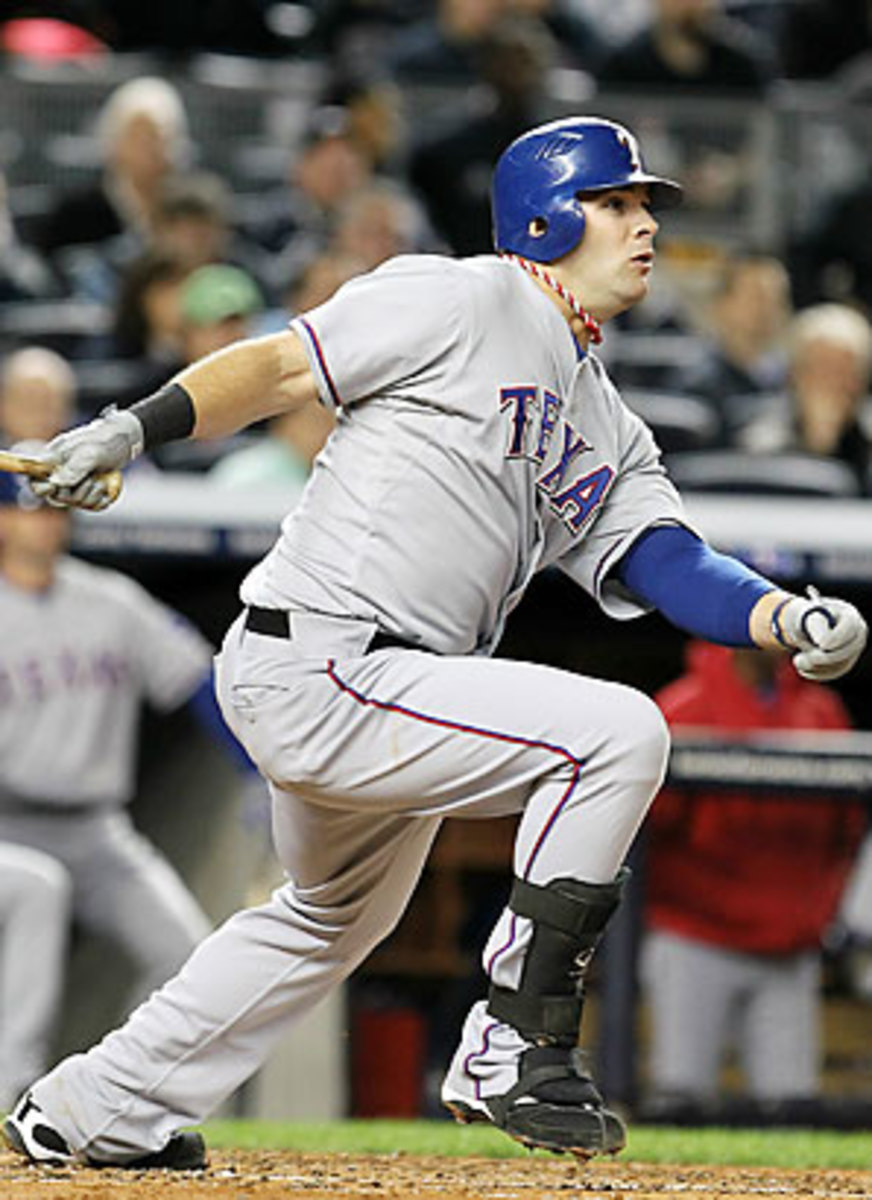Rangers may find way out of Series hole by following unlikely leader


SAN FRANCISCO -- During the American League Championship Series, the Yankees' pitchers again and again singled out one Ranger who had given them a considerable amount of trouble, from a lineup that gave them a considerable amount of trouble. "He was battling all night," said CC Sabathia after Game 5, which the Yankees won to keep their slim hopes alive. "I threw some strikes at him, and couldn't put him away."
"He was one of the toughest outs in this series," lamented Phil Hughes two nights later, after the Rangers had torched him for four earned runs over 4.1 innings, on their way to a series-clinching 6-1 victory.
The culprit was not Josh Hamilton, the ALCS MVP and the probable AL MVP, nor one of the Rangers' other heart-of-the-order sluggers, but first baseman Mitch Moreland, who as of late July was a lightly-regarded prospect who had yet to play a game above Triple-A -- he made his major league debut three months ago Friday -- and was a long shot to be included on any potential postseason roster. Moreland hit .255 with nine home runs during the regular season, and his role on the team was tenuous even as the playoffs began. He spent Game 1 of the ALDS on the bench.
However, Moreland, 25, has played in every game since, starting 11 of 12, and he has been, as the Yankees' starters attested, a difficult out. In the playoffs he ranks second among Rangers regulars in both batting average (.342) and on-base percentage (.390), and through two disheartening World Series losses he has been the only one of them who has hit Giants pitching with any consistency. While the batting averages of Hamilton, Nelson Cruz, Ian Kinsler and Michael Young stand between .111 and .250, Moreland, batting in front of the pitcher, has used his compact lefthanded swing to hit .600, and has reached base in four of his six plate appearances. And all of his at-bats have come against either Tim Lincecum or Matt Cain.
That Moreland is even in the Rangers' lineup is as unexpected as his success in the Series. Two Octobers ago, the Rangers were urging Moreland to try his hand at becoming a pitcher, even though the former 17th-round draft pick had just completed a season with the Clinton (IA) Lumberjacks, then a Rangers Single-A affiliate, in which he'd batted .324 with 18 home runs and 99 RBIs. That was in part because Moreland, who pitched some at Mississippi State, can throw 93-miles-an-hour, but also because his path to becoming the Rangers' first baseman seemed blocked. Ahead of Moreland in the organization were Justin Smoak, the club's '08 first-round pick who Baseball America twice ranked among the game's Top-25 prospects, and Chris Davis, who as a 22-year-old rookie in '08 had hit 17 homers and driven in 55 runs in only half a season in Texas. "They said it was up to me," recalls Moreland, a soft-spoken Mississippian who bears a passing resemblance to Young. "They said, 'We feel like you have a better chance as a pitcher than you do as a hitter. We don't know what kind of hitter you'd be.' I said, 'I'll pitch when hitting doesn't go well.'"
That is a decision for which the Rangers are now grateful. Davis regressed in '09 -- he hit .238 and finished seventh in the American League with 150 strikeouts despite appearing in just 113 games -- and was even worse after being named the club's starting first baseman this spring, batting .192. Smoak, promoted from Triple-A Oklahoma City in late April to replace Davis, was the bait in the trade that the Rangers pulled off two-and-a-half months that brought Cliff Lee to Texas. It was, all of a sudden, Moreland's turn.
Moreland was told that he was being called up on the evening of July 28. He could only sleep four hours that night, and then the next morning made the 215-mile drive from Oklahoma City to Arlington in three hours flat. The Rangers had told him to show up at 2:30 p.m. He arrived at noon. "You always hear, you have to do well, but to make the big leagues there's also a little bit of luck, too," he said. "I've played some first, some outfield, done some different things. But it fell into place, and it happened to do so this year."
Moreland started at first base that night and hit a pair of singles, but the following morning brought some potentially discouraging news: the Rangers had acquired veteran first baseman Jorge Cantu, who at the time had 54 RBIs, from the Marlins. The two platooned for the next month or so, but in September Moreland received nearly twice as many plate appearances as Cantu. In 30 games and 105 regular season plate appearances as a Ranger, Cantu hit .235, with one home run with two RBIs. Moreland had become the regular first baseman for the champions of the AL West, even if it was by default.
Moreland's long-term future as a major leaguer is unclear -- he might not consistently exhibit the power that the Rangers will desire from their first baseman -- but, with Texas in a 2-0 hole in their inaugural World Series, his short-term future ought not to be. Washington -- whose managerial decisions, such as the one to start Vladimir Guerrero in right field in Game 1 and his choices regarding the deployment of relief pitchers, have mostly backfired during the series so far -- will be tempted to start the righthanded-hitting Cantu over Moreland in Game 3, against Giants southpaw Jonathan Sanchez. He shouldn't. What Washington should do is keep his only hot bat in his lineup, and hope that the rest of his hitters follow Moreland's unlikely lead.
